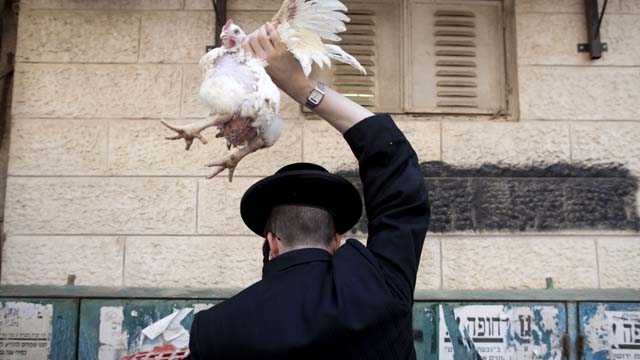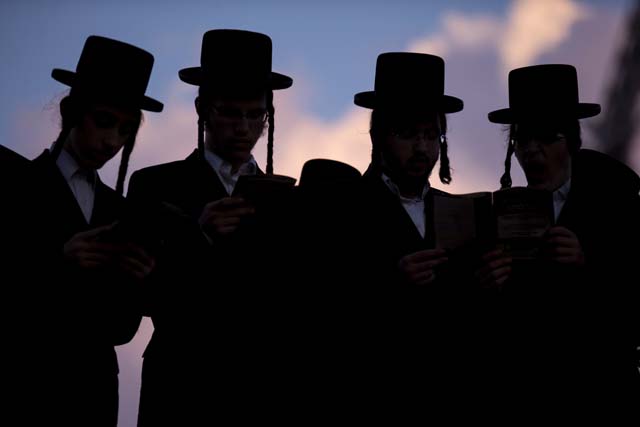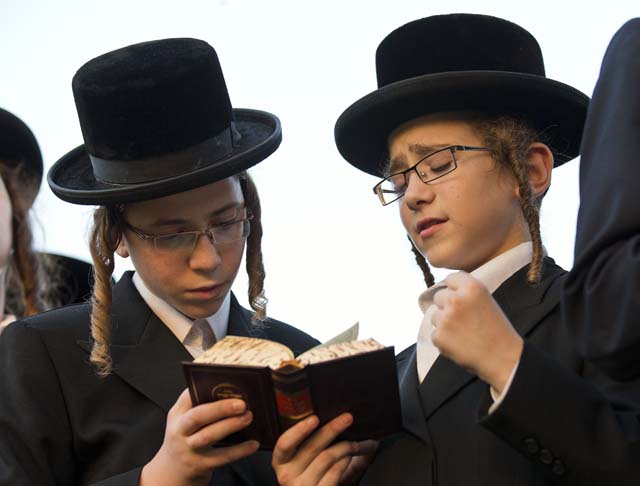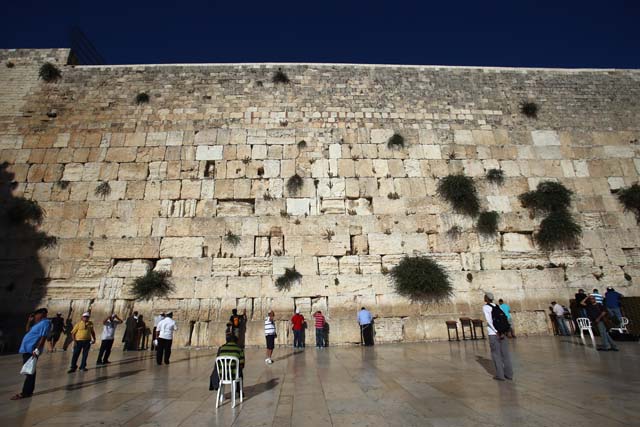
An Ultra-Orthodox Jewish man performs the Kaparot ceremony on October 2, 2014 in Jerusalem, Israel. It is believed that the Jewish ritual, which involves swinging a live chicken above one’s head, transfers the sins of the past year to the chicken, which is then slaughtered and traditionally given to the poor. It is performed before the Day of Atonement, or Yom Kippur, the most important day in the Jewish calendar. (Photo by Lior Mizrahi/Getty Images)
Yom Kippur begins this evening. Here’s what you need to know about the most important day in the Jewish calendar.
1. Day of Atonement

Ultra-Orthodox Jews pray along the Ayarkon River in the city of Ramat Gan near Tel Aviv during the ritual of “Tashlich” on October 2, 2014. Tashlich is a ritual during which believers cast their sins into the water and the fish, and it is performed one day before the Day of Atonement or Yom Kippur. Yom Kippur, the most solemn day in the Jewish calendar, is a 25-hour period of fasting and intense reflection and prayers where the central theme is atonement that begins tomorrow after sunset. AFP PHOTO / JACK GUEZ (Photo credit should read JACK GUEZ/AFP/Getty Images)
Yom Kippur translates to Day of Atonement and is the most solemn and holiest holiday in the Jewish calendar.
It occurs on the tenth day of Tishri, a Jewish month, and is described to Moses in Leviticus 23:26-32:
26 The Lord said to Moses, 27 “The tenth day of this seventh month is the Day of Atonement. Hold a sacred assembly and deny yourselves,[a] and present a food offering to the Lord. 28 Do not do any work on that day, because it is the Day of Atonement, when atonement is made for you before the Lord your God. 29 Those who do not deny themselves on that day must be cut off from their people. 30 I will destroy from among their people anyone who does any work on that day. 31 You shall do no work at all. This is to be a lasting ordinance for the generations to come, wherever you live. 32 It is a day of sabbath rest for you, and you must deny yourselves. From the evening of the ninth day of the month until the following evening you are to observe your sabbath.”
Yom Kippur begins ten days after Rosh Hashanah, which is the first day of Tishri and also the Jewish New Year. Between these two holidays are the Days of Awe. These days are seen as a time to reflect on transgressions committed during the last year.
They end with Yom Kippur.
During Yom Kippur, Jews believe God is preparing to cast judgments on people’s souls , and Yom Kippur is a last appeal to God for forgiveness for the sins of last year. God then enters His judgment into a book and seals our fates.
2. Only Transgressions Against God are Forgiven, Not Man

(JACK GUEZ/AFP/Getty Images)
It’s important to note that while Jewish people seek God for forgiveness during Yom Kippur, the transgressions professed are only transgressions between man and God.
To seek forgiveness between man and man, a Jewish person must seek reconciliation with that person, according to Judaism 101.
3. It’s a Day of Rest and Fasting
Yom Kippur is a sabbath, meaning Jews are supposed to refrain from working during the 25-hours it lasts.
It begins at sunset tonight and ends at nightfall tomorrow.
During this time, observant Jews will also fast.
4. It’s a Solemn Day

Jewish men pray at the Western Wall in Jerusalem, Israel. (Photo by Alex Grimm/Getty Images)
Because Yom Kippur is a solemn holiday, it’s not proper to wish someone a “Happy Yom Kippur.”
The best well-wish someone can say is, “Have an easy fast” or “Good yontif”, or “Good holiday.”
5. Jews Attend Synagogue
Jewish liturgy for Yom Kippur is extensive.
The evening service that begins Yom Kippur is commonly known as Kol Nidre, named for the prayer that begins the service. “Kol nidre” means “all vows,” and in this prayer, we ask G-d to annul all personal vows we may make in the next year. It refers only to vows between the person making them and G-d, such as “If I pass this test, I’ll pray every day for the next 6 months!”
To people of others religions, the Kol Nidre is seen as a major force between anti-semitism and the view that Jews are untrustworthy because it states that only vows between God and Jews are to be upheld, and that vows between men are unimportant. However, this is a confused, misinterpretation of the Kol Nidre. Jews are basically stating that all vows are holy, even taken under duress, and that they must follow all vows.
You can listen to a performance of the Kol Nidre above.